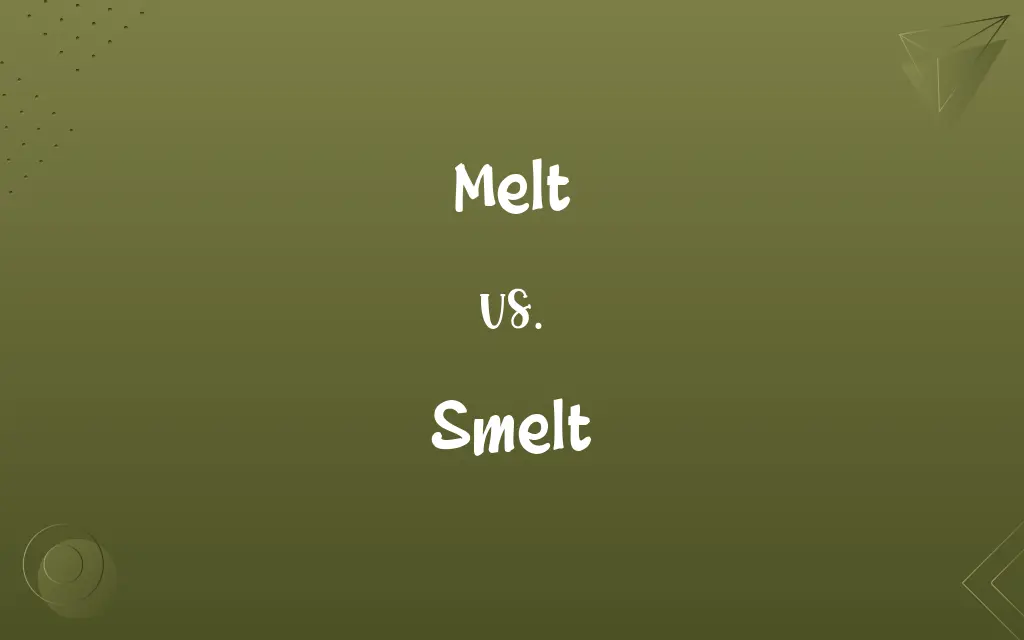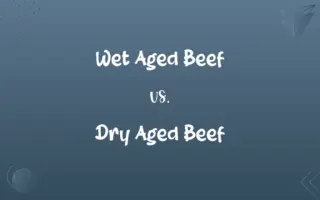Melt vs. Smelt: Know the Difference

By Shumaila Saeed & Dua Fatima || Published on October 15, 2024
Melt involves changing a solid into a liquid via heat, while smelt is a process of extracting metal from ore by heating and melting. Both involve heat but in different contexts and purposes.

Key Differences
Melt is the process by which a solid substance is transformed into a liquid through the application of heat. This change occurs when the substance reaches its melting point, the temperature at which its solid and liquid forms coexist in equilibrium. Smelt, on the other hand, is a specific metallurgical process used to extract a pure metal from its ore. This involves heating the ore to a high temperature in a furnace, often with a reducing agent, to separate the metal from its impurities or from other elements with which it is combined.
Dua Fatima
Oct 15, 2024
Smelting iron ore to produce iron is an example of this process, which not only involves melting but also chemical transformation, changing the ore's composition to extract the metal. For instance, ice melts into water at 0°C, illustrating a physical change where the state of matter changes, but the chemical composition remains the same.
Dua Fatima
Oct 15, 2024
The key difference between melting and smelting lies in their objectives and outcomes. Melting is a physical process that changes the state of a material without altering its chemical composition. It is a broad term applicable to any solid that becomes liquid upon heating. Smelting, however, is a chemical process specifically aimed at extracting metals, involving both the melting of materials and the chemical reduction of ores to purify metals.
Shumaila Saeed
Oct 15, 2024
Melting is a phenomenon that can occur naturally, like the melting of ice in sunlight, smelting is an industrial process that requires technology and human intervention. Smelting is critical in metal production, playing a foundational role in materials science, manufacturing, and engineering.
Shumaila Saeed
Oct 15, 2024
Both processes are essential in their respective contexts: melting for its role in physical changes and its applications in various industries, such as food and plastics, and smelting for its importance in extracting and producing metals. Understanding the distinction between these two processes is crucial in fields ranging from chemistry and physics to metallurgy and environmental science.
Dua Fatima
Oct 15, 2024
ADVERTISEMENT
Comparison Chart
Definition
The process of turning a solid into a liquid.
The process of extracting metal from ore.
Dua Fatima
Oct 15, 2024
Outcome
Change in state without altering composition.
Extraction of metal and removal of impurities.
Shumaila Saeed
Oct 15, 2024
Application
Broad, applicable to any heat-sensitive solid.
Specific to metallurgy and metal extraction.
Dua Fatima
Oct 15, 2024
ADVERTISEMENT
Temperature
Occurs at the melting point.
Requires high temperatures, often above melting point.
Hifza Nasir
Oct 15, 2024
Melt and Smelt Definitions
Melt
Transition from solid to liquid.
The butter melts quickly on the hot pan.
Shumaila Saeed
Feb 28, 2024
Smelt
Extracting metal from ore.
Smelting copper requires high furnace temperatures.
Shumaila Saeed
Feb 28, 2024
Melt
Process affecting various substances.
Snow melts into water when temperatures rise.
Shumaila Saeed
Feb 28, 2024
Smelt
Involves chemical reduction.
Iron is produced by smelting iron ore with coke.
Hifza Nasir
Feb 28, 2024
ADVERTISEMENT
Melt
Dependence on melting point.
Different metals melt at different temperatures.
Dua Fatima
Feb 28, 2024
Melt
Physical change induced by heat.
The wax candle started to melt under the sun.
Dua Fatima
Feb 28, 2024
Smelt
Technologically driven.
Modern smelting uses advanced furnaces for efficiency.
Shumaila Saeed
Feb 28, 2024
Melt
No chemical alteration.
Melting ice does not change its chemical composition.
Shumaila Saeed
Feb 28, 2024
Smelt
Essential in metal production.
Aluminum smelting is a key industrial process.
Shumaila Saeed
Feb 28, 2024
Melt
(ergative) To change (or to be changed) from a solid state to a liquid state, usually by a gradual heat.
I melted butter to make a cake.
When the weather is warm, the snowman will disappear; he will melt.
Hifza Nasir
Feb 28, 2024
Smelt
To melt or fuse (ores) in order to separate the metallic constituents.
Shumaila Saeed
Feb 28, 2024
Smelt
To melt or fuse, as, ore, for the purpose of separating and refining the metal; hence, to reduce; to refine; to flux or scorify; as, to smelt tin.
Shumaila Saeed
Feb 28, 2024
Melt
Reduce or cause to be reduced from a solid to a liquid state, usually by heating;
Melt butter
Melt down gold
The wax melted in the sun
Shumaila Saeed
Feb 28, 2024
Smelt
To fuse or melt two things into one, especially in order to extract metal from ore; to meld.
Shumaila Saeed
Feb 28, 2024
Melt
Become or cause to become soft or liquid;
The sun melted the ice
The ice thawed
The ice cream melted
The heat melted the wax
The giant iceberg dissolved over the years during the global warming phase
Dethaw the meat
Shumaila Saeed
Feb 28, 2024
Melt
To be changed from a solid to a liquid state especially by the application of heat.
Shumaila Saeed
Feb 28, 2024
Melt
To reduce from a solid to a liquid state, as by heat; to liquefy; as, to melt wax, tallow, or lead; to melt ice or snow.
Shumaila Saeed
Feb 28, 2024
Repeatedly Asked Queries
Can all solids melt?
Most solids can melt if the appropriate amount of heat is applied, though some may decompose or undergo a chemical change before melting.
Dua Fatima
Oct 15, 2024
Is smelting only used for metal extraction?
Yes, smelting is specifically used in the metallurgy industry to extract metals from their ores by heating and melting.
Shumaila Saeed
Oct 15, 2024
How does smelting impact the environment?
Smelting can have significant environmental impacts, including air pollution and energy consumption, necessitating regulations and cleaner technologies.
Shumaila Saeed
Oct 15, 2024
What happens to the impurities removed during smelting?
Impurities are separated and often form slag, a by-product that can be recycled or disposed of, depending on its composition.
Shumaila Saeed
Oct 15, 2024
Can melting occur without external heat?
Melting typically requires external heat, but some substances can melt under pressure or due to chemical reactions generating heat.
Shumaila Saeed
Oct 15, 2024
Does melting require special equipment?
Melting can occur with basic heating equipment or naturally, depending on the substance and required temperature, unlike smelting, which requires specific furnaces.
Hifza Nasir
Oct 15, 2024
What advancements have been made in smelting technology?
Recent advancements include more efficient furnaces, cleaner energy sources, and methods to capture and reduce emissions, improving environmental sustainability.
Hifza Nasir
Oct 15, 2024
What is the main difference between melt and smelt?
Melt refers to the process of changing a solid to a liquid through heat, while smelt involves extracting metal from its ore by heating beyond melting, including a chemical reduction process.
Dua Fatima
Oct 15, 2024
Is smelting the only method for extracting metals from ores?
While smelting is a primary method, other techniques, such as electrolysis, are also used depending on the metal and ore type.
Dua Fatima
Oct 15, 2024
How are melting and smelting temperatures determined?
Melting temperatures are determined by a substance's melting point, while smelting temperatures are based on the ore's properties and the metal being extracted.
Dua Fatima
Oct 15, 2024
Why is smelting important in manufacturing?
Smelting is crucial for producing pure metals needed for manufacturing various goods, from electronics to construction materials.
Dua Fatima
Oct 15, 2024
Can melting be reversed?
Yes, freezing or solidification reverses melting, turning a liquid back into a solid by removing heat.
Shumaila Saeed
Oct 15, 2024
How do melting and smelting contribute to recycling?
Both processes are vital in recycling materials, with melting used to reform substances and smelting to recover metals from scrap.
Shumaila Saeed
Oct 15, 2024
What role does chemistry play in smelting?
Chemistry is fundamental in smelting, determining the reactions that separate metals from ores and refining the final product.
Shumaila Saeed
Oct 15, 2024
How does the choice of reducing agent affect smelting?
The reducing agent's effectiveness, cost, and environmental impact can significantly affect the efficiency and sustainability of the smelting process.
Dua Fatima
Oct 15, 2024
Share this page
Link for your blog / website
HTML
Link to share via messenger
About Author
Written by
Shumaila SaeedShumaila Saeed, an expert content creator with 6 years of experience, specializes in distilling complex topics into easily digestible comparisons, shining a light on the nuances that both inform and educate readers with clarity and accuracy.
Co-written by
Dua Fatima








































































